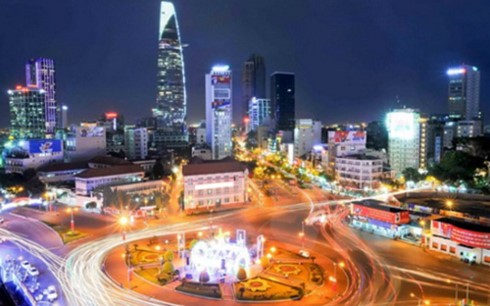 A view of Ho Chi Minh city A view of Ho Chi Minh city
|
During 30 years of renewal and integration, Vietnam has achieved remarkable results. Vietnam has transformed itself from one of the world’s poorest countries into a rapidly developing country, has established diplomatic relations with 185 countries, and has enhanced economic and trade ties with 224 markets worldwide.
Economic development for independence
But there is a risk of too much economic dependence on other countries. Although nearly 80% of its population is involved in agricultural production, Vietnam imports many kinds of plants and animals. Vietnam exports raw materials and cannot control their values and prices. Vietnam’s poor technology and weak support industry have been unable to meet the needs of the manufacturing sectors. Professor, Doctor Truong Giang Long, Deputy Director of the General Department of Politics and President of the People’s Public Security Political Academy, said a strong economy is needed to ensure national independence and self-reliance. “The core of the issue is economics during the integration process. If we are economically dependent, we cannot be independent in other areas. The global economy is interdependent, but we must try to be self-reliant as much as possible.”
Choosing an integration policy
Vietnam’s signing of several new-generation free trade agreements has exposed it to opportunities and challenges. Associate Professor, Doctor Nguyen Vu Tung, Director of the Diplomatic Academy, said economic independence and self-reliance is closely connected with political independence. Active integration will help Vietnam transform challenges into opportunities and advantages in defending national independence. “Maintaining national independence and self-reliance increases high degree of ability of self-determination in choosing an integration policy. Vietnam’s self-determination is influenced by outside forces and we have to compete with more powerful countries in setting the rules of the game.” Tung said.
Accepting selected investment
Analysts say foreign investment is an advantage of economic development and integration. But Vietnam should be selective about investments and avoid courting investment at any price.
Professor, Doctor Nguyen Trong Chuan of the Vietnam Academy of Social Sciences said indiscriminate investments contain risks. “International integration commitments like opening markets and reducing the criteria for foreign investments are potential threats. If we lower environmental protection criteria, we’ll have to pay a high price to resolve subsequent consequences. The government policy of being selective about foreign investment is correct.”
Vietnam is pursuing a course of being active in the integration process while guarding its independence and self-determination.